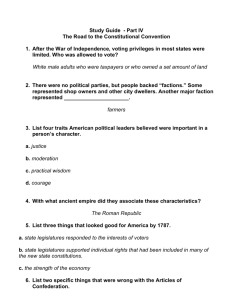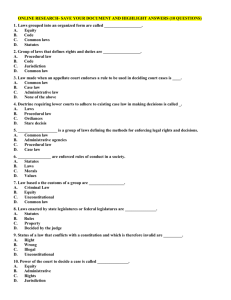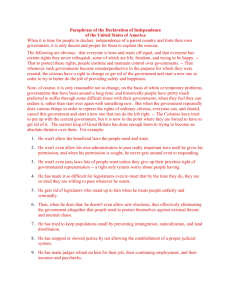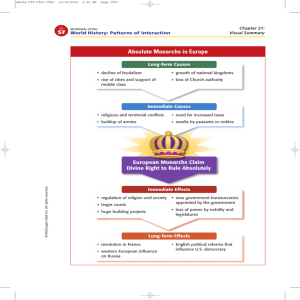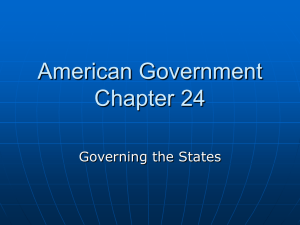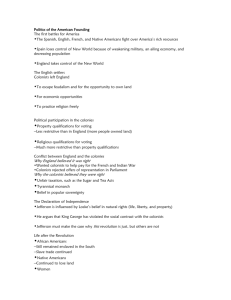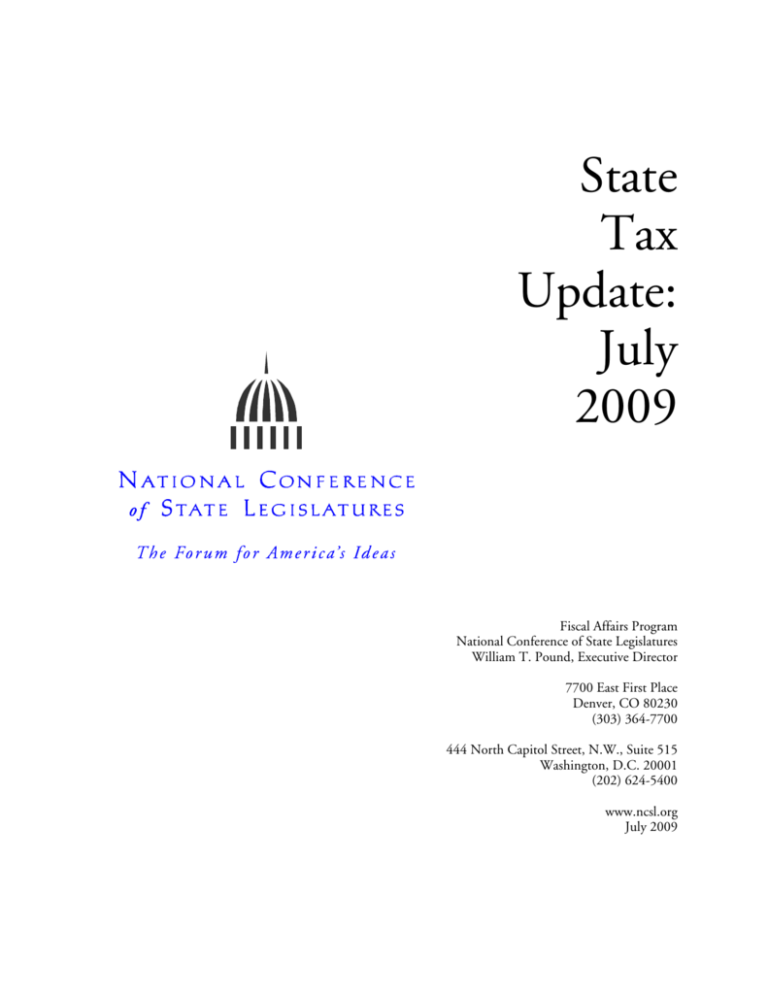
State
Tax
Update:
July
2009
Fiscal Affairs Program
National Conference of State Legislatures
William T. Pound, Executive Director
7700 East First Place
Denver, CO 80230
(303) 364-7700
444 North Capitol Street, N.W., Suite 515
Washington, D.C. 20001
(202) 624-5400
www.ncsl.org
July 2009
The National Conference of State Legislatures is the bipartisan organization that serves the legislators and
staffs of the states, commonwealths and territories.
NCSL provides research, technical assistance and opportunities for policymakers to exchange ideas on the
most pressing state issues and is an effective and respected advocate for the interests of the states in the
American federal system.
NCSL has three objectives:
•
•
•
To improve the quality and effectiveness of state legislatures.
To promote policy innovation and communication among state legislatures.
To ensure state legislatures a strong, cohesive voice in the federal system.
The Conference operates from offices in Denver, Colorado, and Washington, D.C.
Printed on recycled paper
2009 by the National Conference of State Legislatures. All rights reserved.
hiage intentionally left mostly blank
ii
STATE TAX UPDATE: JULY 2009
The economic recession has created serious revenue shortfalls and prompted numerous state
legislatures to increase taxes and fees to shore up budgets during 2009 legislative sessions.
The actions taken by 36 reporting states to date have resulted in a net tax increase of $24
billion that will help offset $142 billion in budget gaps for fiscal year 2010. The tax increases
represent 3 percent of total state tax collections. Sixteen states have increased taxes by more
than 1 percent, while one state cut taxes by more than 1 percent. Nineteen states made no
significant tax policy changes.
Two new trends developed in the personal income tax area -- states relied heavily on the
income tax to raise new revenue, which has not been the case in recent years, and states
specifically asked higher-income earners to temporarily shoulder more of the burden. Top
rates were increased and/or capital gains breaks were scaled back by several states.
Other trends included a significant reliance on new tobacco taxes and a new focus on alcohol
taxes. More than a dozen states raised tobacco or alcohol taxes. There were new assessments
on the health care industry, and business tax breaks were scaled back. Some green economic
incentives were curtailed, slowing a recent trend to encourage renewable energy and
transportation innovations through tax policy.
By contrast, a few states cut taxes. For example, North Dakota cut individual and business
income taxes by $50 million.
Several larger states that were heavily affected by the recession raised fees or taxes. Florida
approved a tobacco tax increase and more than $1 billion in fee increases. Massachusetts
raised its sales tax rate. New York and California approved billions in revenue increases to
patch fiscal holes in their FY 2010 budgets.
National Conference of State Legislatures
This document may not be reprinted without permission.
4
State Tax Update: July 2009
Personal Income Tax
Nine states increased income taxes by at least $1 million each while 10 states reduced them.
Tax increases by large states, including California and New York, contributed to a total
$10.6 billion net tax increase.
•
Oregon added new top rates of 10.8 percent and 11 percent to raise $243 million.
•
California raised income tax rates by 0.25 percent and reduced the dependent credit.
•
Delaware raised taxes on earnings above $60,000.
•
New York raised its top bracket and scaled back a deduction for higher income
earners.
•
Hawaii, New Jersey and Wisconsin raised taxes on high-income earners.
•
Several states scaled back capital gains preferences, including Colorado, Wisconsin
and Vermont.
At the same time, states made targeted income tax reductions:
•
California and Georgia approved a homebuyer credit to stimulate housing
purchases.
•
Idaho expanded a credit for grocery costs by $15 million.
•
Maine replaced multiple tax brackets with a single rate, plus a surcharge on income
over $250,000, which resulted in a net tax cut of $30 million.
•
South Carolina connected to current federal tax law, which reduced state taxes.
Corporation and Business Taxes
Thirteen of the reporting states raised business taxes and seven cut them. Among the tax
increases:
•
Oregon raised its top rate and increased its minimum tax for businesses.
•
Delaware raised gross receipts and business franchise taxes.
•
Wisconsin reduced corporate tax breaks.
•
Nevada adjusted its modified business tax.
•
Kansas reduced business tax credits.
Some states, however, reduced business taxes:
•
North Dakota cut business income taxes by $5 million.
•
Georgia approved business incentives.
National Conference of State Legislatures
This document may not be reprinted without permission.
State Tax Update: July 2009
•
Texas exempted small businesses from its net margins tax.
Sales and Use Tax
Thirteen states increased general sales taxes, though only two did so with sales tax rate
increases. Six states cut sales taxes.
•
California raised its sales tax rate by 1 percent.
•
Massachusetts increased its sales tax rate by 1.25 percent.
•
Colorado eliminated vendor compensation for tax collection to raise $68 million.
•
Maine added entertainment and other services to the sales tax base.
By contrast, some states cut sales taxes:
•
Arkansas reduced its grocery tax by 1 percent cutting taxes by $44 million.
•
Mississippi approved a sales tax holiday and reduced taxes on farm equipment by
$10 million.
Health Care Provider and Industry Taxes
Nine states increased health care provider and industry taxes by $1.5 billion. For example:
•
Alabama increased its hospital assessment by $200 million.
•
Colorado authorized provider fees from hospitals for $337 million.
•
Oregon assessed hospitals for $102 million.
Tobacco and Alcohol-Related Taxes
Thirteen states raised taxes on cigarettes or other tobacco products by a combined $1.6
billion. Five states raised alcohol taxes to generate $180 million.
Regarding tobacco:
•
Florida approved a $1 per pack cigarette tax increase to raise $946 million.
•
Kentucky raised tobacco taxes by $107 million.
•
Arkansas, Delaware, Mississippi, New Hampshire, Vermont and Wisconsin also
raised tobacco taxes.
National Conference of State Legislatures
This document may not be reprinted without permission.
5
6
State Tax Update: July 2009
Regarding alcohol:
•
New Jersey raised taxes on liquor and wine.
•
Oregon included a surcharge on spirits distributed through its liquor control
commission.
•
Kentucky added package alcohol sales to the tax base generating $52 million.
Motor Fuel and Vehicle Taxes
Eight states raised taxes on transportation to generate $1.8 billion.
•
California raised its vehicle license fee by 0.5 percent for an additional $1.7 billion.
•
Colorado increased vehicle fees and fines to generate $200 million.
•
Florida, New Hampshire and Utah also increased vehicle charges.
•
Vermont increased taxes on gasoline to raise $13 million.
Miscellaneous Taxes
Eleven states increased miscellaneous taxes to raise another $1 billion.
•
Delaware approved a tax on crude oil transfers.
•
Nevada and New Hampshire increased room taxes.
•
New York and Tennessee raised taxes on insurance companies.
Fees and Other Nontax Changes
Fifteen states reported fee increases in 2009, while four states accelerated revenue into the
fiscal year, among other nontax changes, to raise $3.3 billion in nontax revenue.
•
Colorado, Florida and New York approved significant fee increases.
•
Tax amnesties took place in several states, including Maryland, New Jersey,
Vermont and Virginia.
•
Delaware added sports betting to its existing gaming activities to generate $53
million.
Overall, the responding states through mid-July have made tax, fee and other revenue
changes resulting in an anticipated $27 billion in revenue increases for FY 2010.
National Conference of State Legislatures
This document may not be reprinted without permission.
7
State Tax Update: July 2009
Figure 1. Net State Tax Changes by Year of Enactment, 1997–2009
$24.3
$24
$22
$20
$18
$16
$14
$12
$10
$8
$6
$4
$2
$0
-$2
-$4
-$6
-$8
-$10
Billions of dollars
10%
8%
Percent of previous year's
collections
6%
3.1%
1.6% 1.6%
$9.1 $8.8 0.8%
$4.1
-0.3%
-0.6%
0.6%
$3.4
-1.6% -1.7% -2.0%
0.2% 0.6%
$4.1
2%
0.5%
0%
$3.8
-2%
$1.1
-4%
-6%
-$1.5
-$2.6
4%
-8%
1997
-$7.1
-$7.3
-$9.9
1998
1999
2000
-10%
2001
2002
2003
2004
2005
2006
2007
2008
Source: National Conference of State Legislatures survey of legislative fiscal offices, 2009.
Table 1. FY 2009 Net State Tax Changes by Type of Tax
Type of Tax
Personal Income
Corporate Income
Sales and Use
Health Care
Tobacco
Motor
Alcoholic Beverage
Miscellaneous
Net Change
Dollars
(in millions)
$10,601.4
$1,387.4
$6,163.0
$1,544.0
$1,589.3
$1,807.6
$179.7
$1,066.3
$24,348.7
Percent of
Total
43.5%
5.7%
25.3%
6.4%
6.5%
7.4%
0.7%
4.4%
100%
Source: National Conference of State Legislatures, 2009.
National Conference of State Legislatures
This document may not be reprinted without permission.
2009
NATIONAL CONFERENCE OF STATE LEGISLATURES
William T. Pound, Executive Director
Denver Office
7700 East First Place
Denver, CO 80230
(303) 364-7700
(303) 364-7800
Washington Office
444 North Capitol Street, N.W., Suite 515
Washington, DC 20001
(202) 624-5400
(202) 737-1069
www.ncsl.org
National Conference of State Legislatures
This document may not be reprinted without permission.

